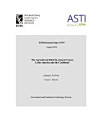Effects of agricultural mechanization on smallholders and their self-selection into farming: An insight from the Nepal Terai
Takeshima, Hiroyuki · Shrestha, Rudra Bahadur · Kaphle, Basu Dev · Karkee, Madhab · Pokhrel, Suroj · Kumar, Anjani
дец 2016. · IFPRI Discussion Paper 1. књига · Intl Food Policy Res Inst
Е-књига
36
Страница
family_home
Испуњава услове
info
reportОцене и рецензије нису верификоване Сазнајте више
О овој е-књизи
This research was undertaken to better assess the role of mechanization in the future of smallholder farmers in Nepal. It addresses the knowledge gap about whether promoting mechanization that is often complementary to land can effectively support smallholders, particularly in the face of a growing nonfarm sector. Rising rural wages in Nepal have increasingly put pressures on smallholder farmers, who tend to operate labor-intensive farming. Agricultural mechanization through custom hiring of tractor services has recently been considered as an option to mitigate the impact of rising labor costs for smallholders. However, the benefit of agricultural mechanization may still be better captured by exploiting the economies of scale of medium to large farmers rather than smallholders. In the meantime, the Nepal agricultural sector still employs a disproportionate share of workers given its share in the economy, potentially depressing agricultural labor productivity. It is therefore an important policy question whether to (1) continue supporting smallholders through custom-hired tractor services or (2) encourage smallholders to rent their farms out to medium-size or larger farmers, while helping smallholders specialize in the nonfarm sector, where their labor productivity may be higher. Using samples from the Terai zone—one of the agroecological belts in Nepal, largely consisting of lowland plains— from the Nepal Living Standards Survey, we assess whether the benefits of hiring in tractor services are greater among medium to large farmers than among smallholders, and how these benefits may depend on smallholders’ decision to remain in or leave farming. This study also contributes to the impact evaluation literature by showing that jointly assessing the effects of two treatments (whether to adopt custom-hired tractor services and continue farming, or to search for better options and specialize in off-farm activities) can lead to different implications than assessing them separately. Our analyses suggest that the government should continue to promote custom-hired tractor services not only for medium to large farmers but also for smallholders. If, over time, barriers to specializing in nonfarm activities are lowered and more smallholders start leaving farming, mechanization may no longer benefit the remaining smallholders. Support for mechanization can then be focused more on medium to large farmers, while types of support other than mechanization can be devised for the remaining smallholders.
Оцените ову е-књигу
Јавите нам своје мишљење.
Информације о читању
Паметни телефони и таблети
Инсталирајте апликацију Google Play књиге за Android и iPad/iPhone. Аутоматски се синхронизује са налогом и омогућава вам да читате онлајн и офлајн где год да се налазите.
Лаптопови и рачунари
Можете да слушате аудио-књиге купљене на Google Play-у помоћу веб-прегледача на рачунару.
Е-читачи и други уређаји
Да бисте читали на уређајима које користе е-мастило, као што су Kobo е-читачи, треба да преузмете фајл и пренесете га на уређај. Пратите детаљна упутства из центра за помоћ да бисте пренели фајлове у подржане е-читаче.








